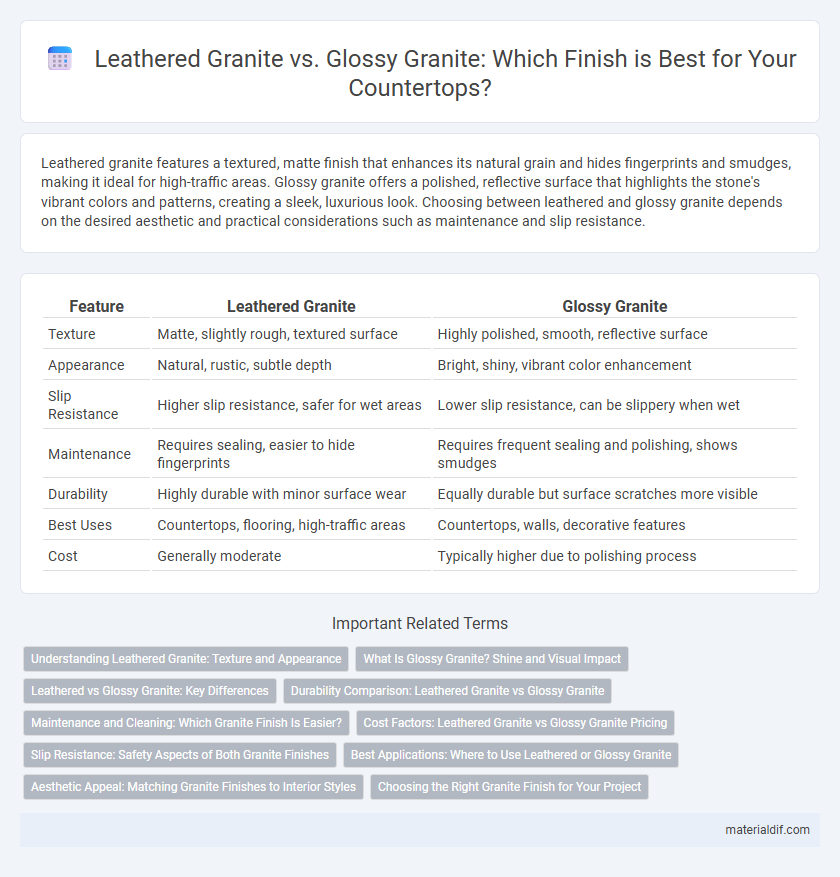Leathered granite features a textured, matte finish that enhances its natural grain and hides fingerprints and smudges, making it ideal for high-traffic areas. Glossy granite offers a polished, reflective surface that highlights the stone's vibrant colors and patterns, creating a sleek, luxurious look. Choosing between leathered and glossy granite depends on the desired aesthetic and practical considerations such as maintenance and slip resistance.
Table of Comparison
| Feature | Leathered Granite | Glossy Granite |
|---|---|---|
| Texture | Matte, slightly rough, textured surface | Highly polished, smooth, reflective surface |
| Appearance | Natural, rustic, subtle depth | Bright, shiny, vibrant color enhancement |
| Slip Resistance | Higher slip resistance, safer for wet areas | Lower slip resistance, can be slippery when wet |
| Maintenance | Requires sealing, easier to hide fingerprints | Requires frequent sealing and polishing, shows smudges |
| Durability | Highly durable with minor surface wear | Equally durable but surface scratches more visible |
| Best Uses | Countertops, flooring, high-traffic areas | Countertops, walls, decorative features |
| Cost | Generally moderate | Typically higher due to polishing process |
Understanding Leathered Granite: Texture and Appearance
Leathered granite features a textured, matte finish achieved through a specialized brushing process that enhances its natural grain and masks fingerprints and smudges. This finish offers a soft, tactile feel with a slightly rough surface that provides slip resistance, making it ideal for countertops and high-traffic areas. In contrast to glossy granite, leathered granite emphasizes a subdued, earthy appearance with muted reflections and deeper, more vibrant stone colors.
What Is Glossy Granite? Shine and Visual Impact
Glossy granite features a highly polished surface that enhances its natural colors and patterns, creating a mirror-like shine with superior light reflection. This finish amplifies the stone's visual impact, making it ideal for spaces requiring a luxurious and vibrant appearance. The intense gloss highlights intricate mineral details, adding depth and elegance to countertops, floors, and walls.
Leathered vs Glossy Granite: Key Differences
Leathered granite features a textured, matte finish that enhances its natural stone appearance and provides a non-reflective surface ideal for high-traffic areas, while glossy granite has a polished, reflective surface that highlights mineral patterns and offers a sleek, shiny look but can show fingerprints and scratches more easily. Leathered granite is more slip-resistant and hides imperfections better, making it suitable for countertops and flooring in kitchens and bathrooms, whereas glossy granite is often chosen for its vibrant, mirror-like aesthetics in decorative applications. Maintenance for leathered granite involves gentle cleaning to preserve texture, whereas glossy granite requires regular polishing to maintain its shine.
Durability Comparison: Leathered Granite vs Glossy Granite
Leathered granite offers enhanced durability due to its textured surface, which resists scratches, stains, and wear more effectively than glossy granite. Glossy granite, while visually striking with its reflective finish, is more prone to surface scratches, etching, and visible fingerprints, requiring more frequent maintenance. Both types provide strong, long-lasting surfaces, but leathered granite performs better in high-traffic or heavy-use areas where durability is crucial.
Maintenance and Cleaning: Which Granite Finish Is Easier?
Leathered granite offers a textured surface that effectively hides fingerprints and smudges, requiring less frequent cleaning compared to glossy granite, which shows smudges and dirt more prominently on its reflective surface. Cleaning leathered granite involves using mild soap and water to maintain its matte sheen without streaks, while glossy granite benefits from specialized granite cleaners to preserve its high-shine finish and prevent surface scratches. Overall, leathered granite is easier to maintain due to its forgiving texture and lower visibility of dirt.
Cost Factors: Leathered Granite vs Glossy Granite Pricing
Leathered granite typically costs more than glossy granite due to its specialized finishing process that enhances texture and durability, adding labor and production expenses. Glossy granite, produced through polishing, generally involves lower manufacturing costs but may require more maintenance to preserve its shine over time. Pricing variations also depend on the granite's origin, color, and thickness, with leathered finishes often commanding a premium for their unique aesthetic and slip-resistant properties.
Slip Resistance: Safety Aspects of Both Granite Finishes
Leathered granite offers superior slip resistance due to its textured surface, making it ideal for areas prone to moisture and heavy foot traffic. Glossy granite, with its smooth and polished finish, tends to be more slippery when wet, increasing the risk of slips and falls in safety-sensitive environments. Prioritizing slip resistance, leathered granite is preferred for safer flooring in kitchens, bathrooms, and outdoor spaces.
Best Applications: Where to Use Leathered or Glossy Granite
Leathered granite offers a textured, matte finish that excels in high-traffic areas such as kitchen countertops, outdoor patios, and bathroom vanities, providing slip resistance and hiding fingerprints or scratches effectively. Glossy granite features a smooth, polished surface ideal for formal settings like dining tables, fireplace surrounds, and decorative wall cladding, where its reflective quality enhances light and color vibrancy. Selecting leathered or glossy granite depends on functional needs and aesthetic preferences, balancing durability with visual appeal in various residential or commercial applications.
Aesthetic Appeal: Matching Granite Finishes to Interior Styles
Leathered granite offers a matte, textured surface that enhances rustic, natural, and earthy interior styles by emphasizing organic patterns and a soft, tactile feel. Glossy granite, with its polished and reflective finish, complements modern, luxurious, and contemporary spaces by creating a sleek, sophisticated ambiance that highlights bold color contrasts and intricate veining. Choosing between leathered and glossy granite finishes depends on the desired aesthetic impact and harmony with overall interior design themes.
Choosing the Right Granite Finish for Your Project
Leathered granite offers a textured, matte surface that enhances slip resistance and conceals fingerprints, making it ideal for high-traffic areas and kitchen countertops. Glossy granite provides a polished, reflective finish that highlights the stone's natural colors and veining, perfect for luxurious bathroom vanities and decorative accents. Selecting the right granite finish depends on balancing aesthetic preferences with practical needs such as maintenance, durability, and safety.
Leathered Granite vs Glossy Granite Infographic

 materialdif.com
materialdif.com